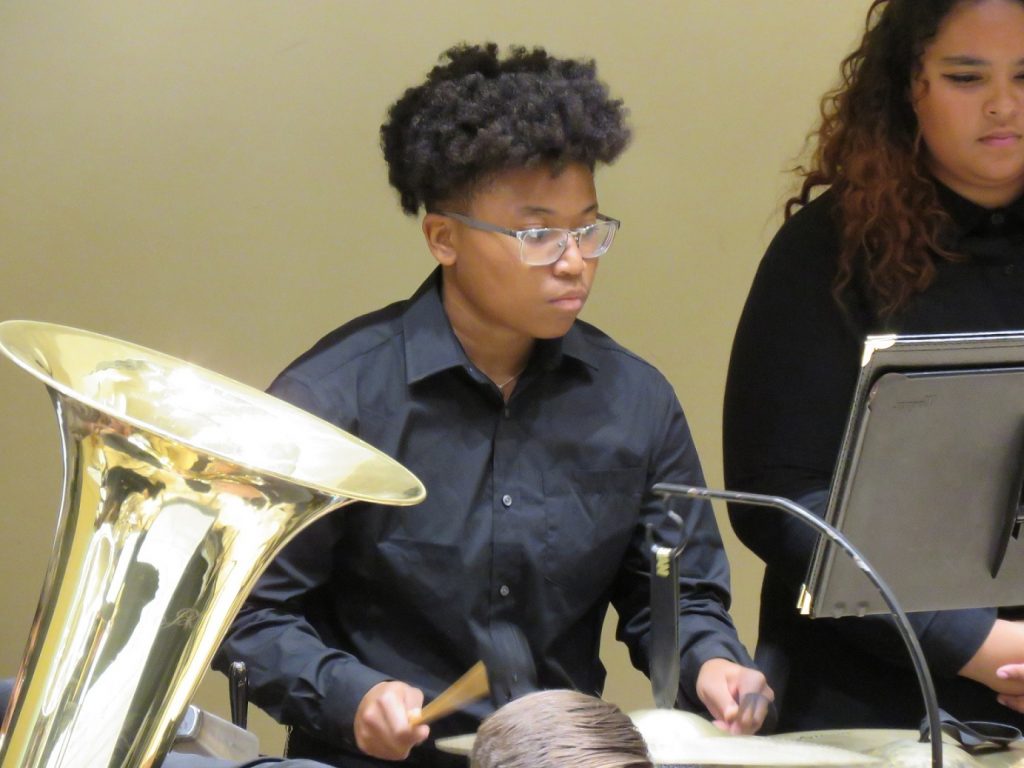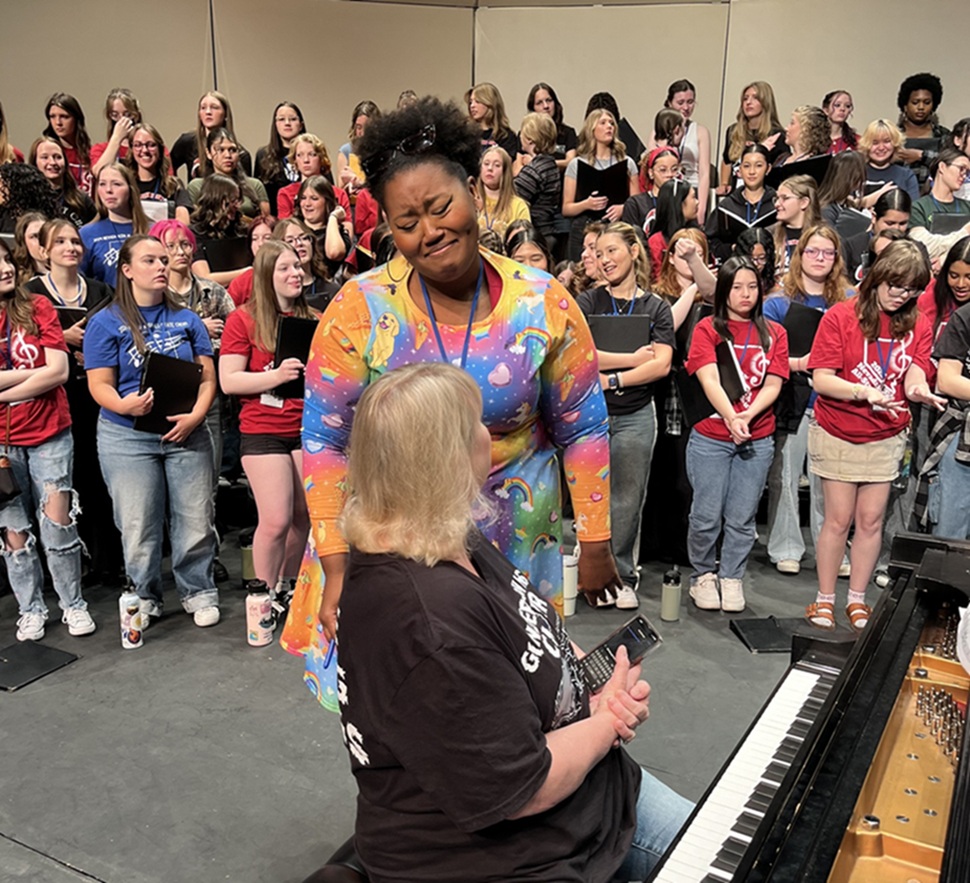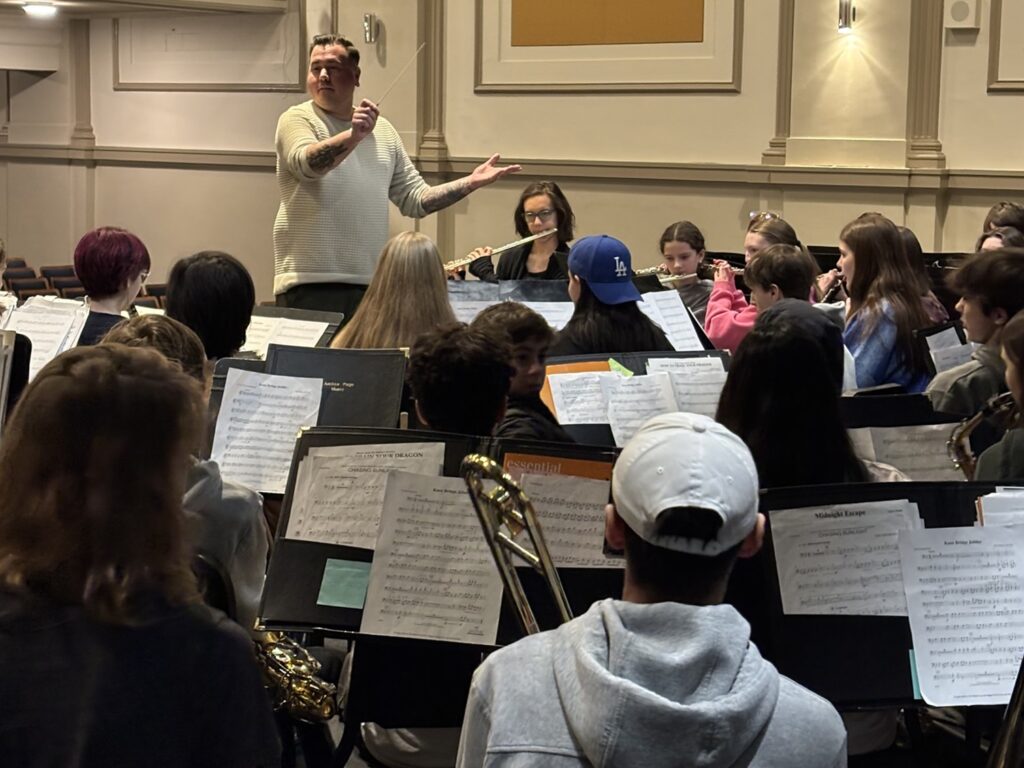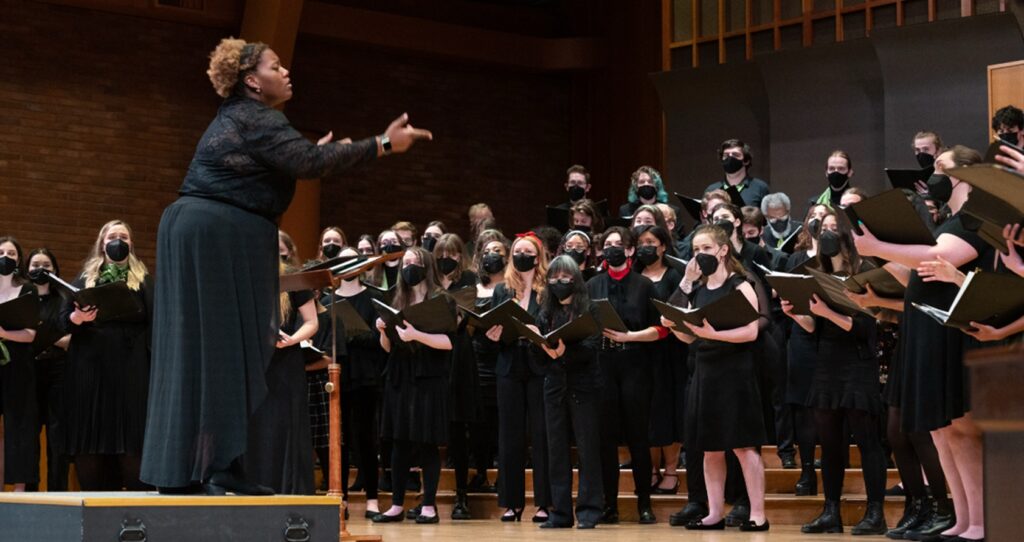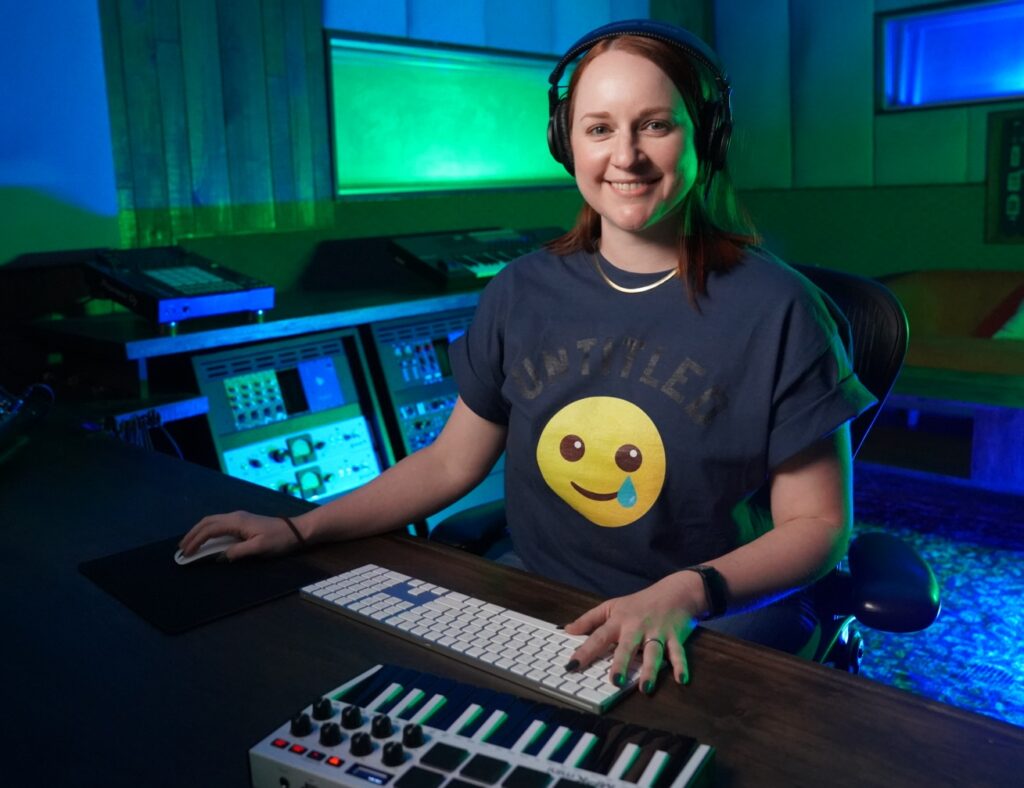Tagged Under:
A University’s Community Engagement Promotes Leadership and Creativity
At Slippery Rock University in Pennsylvania, students can participate in several early childhood music education opportunities thanks to the efforts of one of their professors.
Dr. Cassandra Eisenreich loves teaching future music educators at Slippery Rock University (SRU) in Western Pennsylvania, but she also wanted to teach youth — an opportunity that didn’t readily present itself to the Associate Professor of Music Education and Flute. So, about 11 years ago, Eisenreich decided to do something about it.
She branched out into the community outside of her teaching job at SRU to work with little kids. She brought a group of preschoolers from Head Start, a federally funded program that provides preschool education to children from low-income families, to Slippery Rock to take an age-specific music class with her.
Focus on Early Childhood Music Education
“It was really important to me to keep teaching children,” says Eisenreich, who grew up in the nearby Pittsburgh area. “I guide future teachers on what to do, when to do it, and how to do it in the classroom, so I wanted to stay actively involved in the classroom experience myself.”
Eisenreich loved the experience and began offering the opportunity to her students to regularly co-teach classes of preschool children, outside of their regular coursework. What started as a single class quickly evolved into a comprehensive, multi-tiered initiative that now includes ongoing early childhood music programming, student mentorship and training, curriculum development and partnerships with community organizations.
This program is one component of the Slippery Rock University Early Childhood and Elementary Music Community Engagement Initiative, which Eisenreich founded in 2014 and continues to direct. The initiative provides musical services — performances, educational workshops and classes — for people of all ages in the surrounding Slippery Rock community as well as Butler and Allegheny County.
“None of it was part of my job,” Eisenreich says. “It has grown into this very large community engagement initiative that I’m very passionate about. We just keep growing. I feel very lucky to be a part of it. The most rewarding part has been watching both our SRU students and the children they serve grow together through music.”
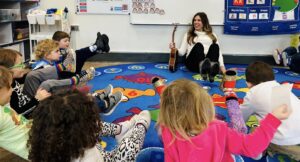
A Win-Win Situation
In one of the key programs of the Community Engagement Initiative, Eisenreich and her college students co-teach classes of about 20 preschool children. After the session with preschoolers is completed, Eisenreich hires the students who thrived while working with small children to co-teach their own preschool classes.
“My SRU music education students go through a process that includes guided observations, collaborative lesson planning and reflective teaching rounds before independently leading their own classes.,” Eisenreich explains. “This hands-on model helps preservice teachers build confidence and pedagogical skill in a supportive, mentored environment. It’s a win-win situation — my students get to run their own class, and children who otherwise wouldn’t have the opportunity are engaging in preschool music education. It’s all very exciting.”
The free preschool class sessions emphasize fostering creativity through a playful, exploratory environment. Children engage in joyful singing, imaginative movement and hands-on experiences with percussion instruments. Eisenreich incorporates hands-on opportunities for exploration and discovery, including an interactive instrument “petting zoo” to inspire curiosity and foster a lifelong love of music from an early age.
“Everything is rooted in play,” she says. “All the activities that we do are playful and imaginative. That’s how children learn best. Beyond music-making, the sessions are designed to support social-emotional development, early literacy and motor coordination. Caregivers are encouraged to attend and participate, fostering connection and continuity of learning and love of music at home.”
Teaching 3- to 5-year-olds isn’t for everyone because it can be very challenging, Eisenreich says. But some of her SRU students have been surprised by how much they enjoy interacting with preschool children.
“Some people hesitate to work with young children because they feel disconnected from that age group,” she explains. “But once they engage with a 4- or 5-year-old, their perspective often shifts. I believe our program provides an excellent opportunity for students to explore and embrace working with young kids.”
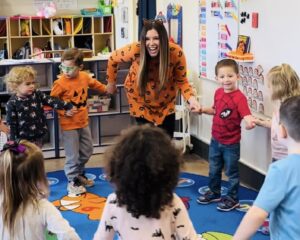
Developing Lifelong Music Lovers
Eisenreich and many of her students are drawn to the natural joy and enthusiasm that young children display. “It’s just infectious and magnetic, and I live in that space,” she says. “I feed off of their very real, authentic energy over things that are so simple.”
Another appeal of working with young children, Eisenreich says, is the chance to influence them as people.
“You’re teaching your content area, but you’re also trying to develop character and craft these children into beautiful, contributing members of society,” she says. “We’re teaching music but also using music as a vehicle to teach so much more. Every day is different, so things are always exciting and fresh … which provides ample teachable moments.”
At such a young age, keeping expectations realistic is important, Eisenreich says. “We’re not trying to make the next Mozart, although that would be lovely,” she says. “We’re trying to craft lifelong lovers of music and learning.”
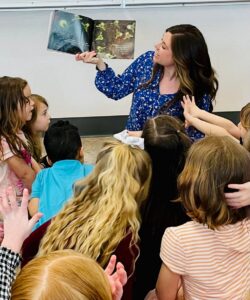
Joyful Experiences for Young Children
Rooted in community connection and experiential learning, the free Family Music Series at Slippery Rock University is a core part of Eisenreich’s initiative. Designed to provide joyful, high-quality musical experiences for young children and their caregivers, the series includes three Sing, Move, Play! sessions and two Tuneful Tales sessions each year.
Sing, Move, Play! mirrors the structure and philosophy of Eisenreich’s preschool music classes, featuring singing, movement, instrument exploration and imaginative play. Tuneful Tales blends live music and storytelling, inviting children to participate in musical narratives through narration, character voices and interactive soundscapes.
All sessions are free, open to the public and led by SRU students — giving them valuable hands-on experience in early childhood music education while strengthening ties with the community.
In addition to on-campus programming, the Sing, Move, Play! program is also offered at the Children’s Museum of Pittsburgh. Eisenreich adapted the sessions specifically for this setting, maintaining the same playful, imaginative approach that defines her preschool music classes. SRU students lead the sessions, engaging children and their families through singing, movement and instrument exploration in a dynamic, museum-based environment.
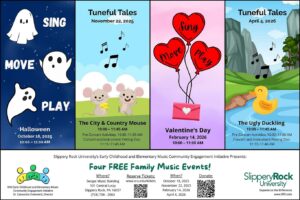
Other Community Activities for Students
The Community Engagement Initiative that Eisenreich runs includes several other programs for the community, such as the Summer Music Education Institute, which draws participants from across the region. Workshops have included Modern Band, World Music Drumming, Drumming Up the Fun, Feierabend First Steps in Music and Conversational Solfege, and WindStars.
Through the Music Education Field Experience, SRU students can participate in a four-stage process at area K-12 schools. The stages include observation, exploration where they assist in music classes, pre-student teaching and student teaching.
Eisenreich’s students can also participate in the kid-oriented Fiddlesticks concerts at the Pittsburgh Symphony Orchestra, where they offer hands-on activities in the lobby before the concert to help children get to know musical instruments. The concert is designed for kids ages 3 to 8 in a relaxed, informal atmosphere that is inviting to little ones, who don’t have to be super quiet like they would at a regular symphony concert.
“Sometimes, families worry about taking their children to a concert because they may not sit still and might make noise,” Eisenreich says. “The entire purpose of the Fiddlesticks concerts is to let kids be themselves.”
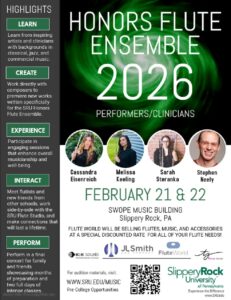
Beyond her university role, Eisenreich maintains an active performance career as the principal flutist of the Butler County Symphony Orchestra, appearing regularly in their concert season, and as a member of BETA Quartet, which is hailed for its innovative programming and dynamic chamber music performances. In 2025, she was recognized as a Yamaha “40 Under 40” music educator and was a quarterfinalist for the 2026 GRAMMY Music Educator Award.
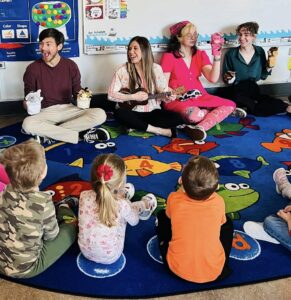
A Creative Outlet
Jenna Diem, an SRU music education and vocal performance major who is graduating in December, has participated in every program in Eisenreich’s initiative. She has taught preschool music classes, organized activities for on-campus events such as Sing, Move, Play and Tuneful Tales, and served as one of the room leaders of the Music and Movement Room for the Pittsburgh Symphony Orchestra’s Fiddlesticks family concert series.
“I have loved every second of Dr. Eisenreich’s whole initiative,” Diem says. “It’s been a great experience and has been a really big creative outlet for me. In day-to-day life at school, there aren’t many opportunities to be creative, but through the community engagement programs, I’ve had the ability to think outside the box and create lessons. I’ve been able to test the limits of my creativity and see how far I can go.”
A particularly fun project that Diem enjoyed was the Know Better Do Better Project, which was created and formed by a group of musicians in 2020. This project is dedicated to writing alternative songs to children’s music that is historically inappropriate, racist or problematic. Eisenreich encourages and invites all her students to participate in this project because it means a lot to her.
Diem created a new song to replace “Five Little Monkeys,” which has historically racist themes. She took the counting element of the song to create “Five Little Bees.” Some of the lyrics include:
Five little bees all snug in their hive.
One little bee went and flew outside.
It flew all around and it went to explore.
Now snug in their beehive are the little bees four.
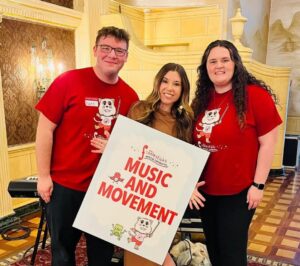
Opportunity to Step Up, Teach and Lead
Through Eisenreich’s initiative, students can get involved with serving the community musically in different ways, Diem says, and the professor gives her students a lot of room to step up, teach and lead.
“One of Dr. Eisenreich’s big philosophies is: teacher-facilitated and student-led. She gives us all the tools and sets us free,” Diem explains. “Slippery Rock students are allowed to fully explore while still having her support throughout the program. You get the experience of teaching on your own, but you can go to her for help if you feel like you’re on the verge of crashing and burning.”
Eisenreich’s approach gives her students a head start in their teaching careers because they have already had a chance to get hands-on experience, explore their teaching styles and get feedback. Her passion for music and teaching really impacts her students, Diem says.
“As a student in her classroom, you leave feeling very inspired,” Diem says. “Dr. Eisenreich is very hands-on. She’s so knowledgeable, especially with early childhood education and general music. She is an incredible mentor.”










